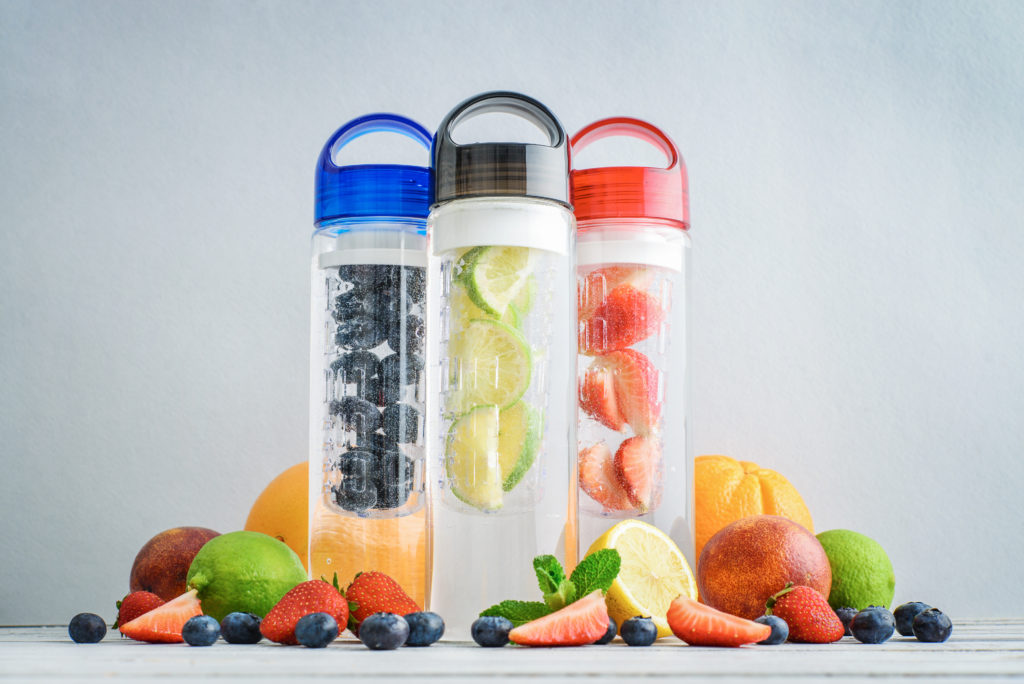
Why is Hydration Important and How Much Do I Really Need to Drink?
Avril Rowerdink, RDN, LDN, CES shares some insights into the importance of hydration and practical ways to make sure you are getting enough water daily.
The human body is made up of ~50-60% water, and we know that water is essential for survival. But did you know that mild dehydration could be the trigger behind that afternoon fatigue and brain fog? And just a 1-2% decrease in hydration can negatively affect athletic performance. Plenty of studies and surveys show that most Americans are living daily in a less than ideally hydrated state. In fact, according to one study, 83% of women and 95% of men do not meet water intake guidelines.
What does water do in the body?
- Transports nutrients from the food we eat around the body
- Helps to control body temperature
- Aids digestion
- Flushes waste from the body
- Cushions organs, protects the brain
- Lubricates joints
- Promotes gastrointestinal regularity
- Maintains blood volume
- Maintains normal muscle function
- Helps prevent kidney stones
Do I really need to drink water, and how much is enough?
Water is the most efficient source of hydration. But there are plenty of foods and beverages that contribute to hydration, such as naturally flavored still and sparkling water, moderate intake of coffee and tea (green, white, black), herbal tea, all fruits (think watermelon!), all vegetables, soups, broths, milk, and yogurt.
A good rule of thumb is to aim for half of your body weight (in pounds) in ounces of water. For example, a 150-pound person should aim for 75 ounces, or a little over 9 cups, for their basic daily needs. Fluid needs go up during sweating (such as when exercising or when outside on hot or humid days), during illness with a fever when experiencing diarrhea or vomiting, and with pregnancy or breastfeeding.
What about sports drinks?
Staying hydrated isn’t only about drinking enough water, but also ensuring your body has the right balance of electrolytes (like sodium, potassium, and magnesium) to pull the water into your cells where it’s needed. The average healthy person likely won’t have trouble with electrolyte balance – a varied diet with plenty of fruits and vegetables and moderate in salt is all you need. However, supplementation with electrolytes may be of use to someone who exercises or otherwise sweats a lot. Talk this over with your dietitian. In addition to electrolytes, most sports drinks have significant sugar content and are typically not appropriate for everyday use. These are designed for use during exercise that lasts longer than 60 minutes.
How do I know I am getting enough water?
One way is to set a daily water intake goal and then track it – by measuring it and writing it down or using a tracking app, such as the Plant Nanny App. Another way is to pay attention to the color of your urine – if you are adequately hydrated, it should be pale yellow to almost clear.
Signs of mild dehydration:
- Thirst
- Fatigue
- Irritability
- Headache
- Dizziness
- Fainting
- Increased heart rate
- Decreased focus
- Dry lips
- Flushed skin
- Dark urine
Strategies for increasing water intake:
- Drink a glass of water when you wake up.
- Carry a reusable bottle with you throughout the day – take it in the car, to work, to the gym, on errands, etc. Measure it so you’ll know how many bottles to drink, and how to space them appropriately, in order to meet your target.
- If you prefer cold water, fill your bottle halfway and freeze it overnight.
- If you prefer the flavor, try adding sliced cucumbers, mint leaves, or orange/lemon wedges, or try natural flavor enhancers such as Stur or True Lemon.
- Drink a glass of water before eating meals.
- Set reminders for water intake using your smartphone, or a water tracking app.
- Replace sugar-containing beverages with water.
- Consider investing in a smart water bottle – one that tracks your water intake, cues you to drink, and syncs with a tracking app.
- If you drink alcohol, try alternating alcoholic beverages with a glass of water.
Ultimately, don’t ignore thirst. You can become dehydrated before the signs, such as low energy or headache, are recognized. In fact, dehydration can be masked as hunger, which is not helpful when trying to stay on point with healthy eating behaviors. It’s easy to get distracted and get behind on fluid intake. Stay ahead of dehydration by using the strategies listed here.
We are Here to Help You
Our Dietitians/Nutritionists are here to help you and our office is open. Most major health insurance companies are now covering telehealth visits, usually at no cost to you. Our office will verify your benefits for you – both for existing patients and new patients. Navigating hydration, meals, and snacks is an essential part of managing your health. Let us help you get on track and find a suitable individualized approach to help you to stay healthy.
Click here to contact us for more information.
If you enjoyed and benefited from this information, please like and share it.
Yours in health and wellness,
Avril Rowerdink, RDN, LDN, CES
Call Us Today: 919-990-1130





